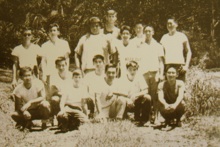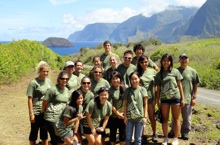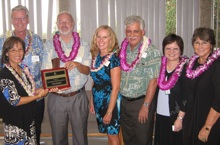
Issue 13 | October 26, 2011
News & Events
Age Has Its Privileges
 We are compiling a list of
our oldest graduates in order to recognize and celebrate them, and we
would appreciate your help in locating them. If you or someone you know
graduated from CTAHR prior to 1950, please send the graduate’s name, address,
and phone number or e-mail to CTAHR Notes (ctahrnotes@ctahr.hawaii.edu)
or phone Frederika at 956-3092. Mahalo for your assistance!
We are compiling a list of
our oldest graduates in order to recognize and celebrate them, and we
would appreciate your help in locating them. If you or someone you know
graduated from CTAHR prior to 1950, please send the graduate’s name, address,
and phone number or e-mail to CTAHR Notes (ctahrnotes@ctahr.hawaii.edu)
or phone Frederika at 956-3092. Mahalo for your assistance!
Grants & Awards
Bee Inventive
 Ethel Villalobos (PEPS) was
awarded the Western Apicultural Society’s Thurber Award for Inventiveness. She
was selected for her devotion to providing immediate help, through research,
education, and outreach, to Hawai‘i beekeepers in dealing with new bee pests in
the state. The Thurber award is presented at W.A.S’s annual banquet to an
individual who has demonstrated exceptional creativity in formulating
beekeeping devices or practices. Pictured presenting the award to Ethel (right)
is Jenny Bach, vice president of W.A.S.
Ethel Villalobos (PEPS) was
awarded the Western Apicultural Society’s Thurber Award for Inventiveness. She
was selected for her devotion to providing immediate help, through research,
education, and outreach, to Hawai‘i beekeepers in dealing with new bee pests in
the state. The Thurber award is presented at W.A.S’s annual banquet to an
individual who has demonstrated exceptional creativity in formulating
beekeeping devices or practices. Pictured presenting the award to Ethel (right)
is Jenny Bach, vice president of W.A.S.
Go With the Flow
 Sergio Santiago-Melendez
(NREM, PhD student) was
recently chosen as the winner in the Agriculture category of the 2011
Irrigation Foundation essay/video contest. A panel of industry and academic
judges scored each submission on the topic “How Will Irrigation Careers Be
Affected by Limited Water Supplies in the Future?” and selected one winner from
each of two categories, turf/landscape and agriculture. Sergio’s entry dealt
with ways to focus on integrated water resource management and sustainable
agricultural practices in future irrigation career training. He and his faculty
advisor, Ali Fares, will receive all-expense-paid trips to the Irrigation Show
in San Diego, at which he will be able to attend classes on such subjects as
“Center Pivot Design” and “Understanding Pumps” and meet with other academics
and industry professionals.
Sergio Santiago-Melendez
(NREM, PhD student) was
recently chosen as the winner in the Agriculture category of the 2011
Irrigation Foundation essay/video contest. A panel of industry and academic
judges scored each submission on the topic “How Will Irrigation Careers Be
Affected by Limited Water Supplies in the Future?” and selected one winner from
each of two categories, turf/landscape and agriculture. Sergio’s entry dealt
with ways to focus on integrated water resource management and sustainable
agricultural practices in future irrigation career training. He and his faculty
advisor, Ali Fares, will receive all-expense-paid trips to the Irrigation Show
in San Diego, at which he will be able to attend classes on such subjects as
“Center Pivot Design” and “Understanding Pumps” and meet with other academics
and industry professionals.
How Safe Is Your Food?
 A partnership comprised of
the University of Tennessee, New Mexico State University, and CTAHR was awarded
a competitive grant from the federal Food and Drug Administration to provide
high-quality food and feed protection training that supports a national
integrated food safety system. As the complexity of the nation's food supply
grows, there is a concomitant need to safeguard what people consume. Food-borne
illness affects 48 million individuals, hospitalizing 128,000 and killing 3,000
annually. The Hawai‘i team, led by Barry Brennan (PEPS), received $805,979 over
five years to participate in the larger national initiative and to provide
expertise regarding ethnic food import issues and food safety issues during
times of natural and technological disasters.
A partnership comprised of
the University of Tennessee, New Mexico State University, and CTAHR was awarded
a competitive grant from the federal Food and Drug Administration to provide
high-quality food and feed protection training that supports a national
integrated food safety system. As the complexity of the nation's food supply
grows, there is a concomitant need to safeguard what people consume. Food-borne
illness affects 48 million individuals, hospitalizing 128,000 and killing 3,000
annually. The Hawai‘i team, led by Barry Brennan (PEPS), received $805,979 over
five years to participate in the larger national initiative and to provide
expertise regarding ethnic food import issues and food safety issues during
times of natural and technological disasters.
Spotlight on Our Community
Meaningful on Moloka‘i
 Early in the morning of
Oct. 1, nineteen CTAHR students and staff members headed to Moloka‘i for
CTAHR’s eighth annual Meaningful Experience trip. First the group made their
way to a mule barn for their tour down to Kalaupapa, a trek made unforgettable
by the breathtaking ocean views along the precarious edges of the world’s
highest sea cliffs and the necessity of having to trust their lives to the
sure-footed mules. During a guided tour through the colony of Kalaupapa, the students
learned of the history of its inhabitants with Hansen’s disease/leprosy, as
well as the current state of the town. Later that evening, students engaged in
team-building exercises led by Rouel Velasco of Student Life and Development,
which strengthened their communication and group skills. After a few hours of
activities the group traveled to Kanemitsu’s Bakery for a late-night Moloka‘i
hot bread run. The next morning, students continued their Meaningful Experience
at Rick Tamanaha’s organic farm. Stories from accountant-turned-farmer Rick
entertained and educated the group as they helped prepare seedlings for the
next papaya planting and pruned the papaya trees. After a few hours in the sun,
all came back for a huge lunch with the Tamanaha ‘ohana and family friends who
were helping that day. Then the students were rewarded with the fruits of their
labor, literally, as they got to pick fresh papaya to take home. A huge mahalo
to Rick Tamanaha and his family for graciously hosting the group on his farm,
Alton Arakaki of the Moloka‘i extension office for assisting in arranging the
activities on Moloka‘i, ASAO for supporting the students’ trip, and Rouel
Velasco for facilitating the team-building exercises! A thank you also goes to
the students who participated and made this experience meaningful for all the
attendees.
Early in the morning of
Oct. 1, nineteen CTAHR students and staff members headed to Moloka‘i for
CTAHR’s eighth annual Meaningful Experience trip. First the group made their
way to a mule barn for their tour down to Kalaupapa, a trek made unforgettable
by the breathtaking ocean views along the precarious edges of the world’s
highest sea cliffs and the necessity of having to trust their lives to the
sure-footed mules. During a guided tour through the colony of Kalaupapa, the students
learned of the history of its inhabitants with Hansen’s disease/leprosy, as
well as the current state of the town. Later that evening, students engaged in
team-building exercises led by Rouel Velasco of Student Life and Development,
which strengthened their communication and group skills. After a few hours of
activities the group traveled to Kanemitsu’s Bakery for a late-night Moloka‘i
hot bread run. The next morning, students continued their Meaningful Experience
at Rick Tamanaha’s organic farm. Stories from accountant-turned-farmer Rick
entertained and educated the group as they helped prepare seedlings for the
next papaya planting and pruned the papaya trees. After a few hours in the sun,
all came back for a huge lunch with the Tamanaha ‘ohana and family friends who
were helping that day. Then the students were rewarded with the fruits of their
labor, literally, as they got to pick fresh papaya to take home. A huge mahalo
to Rick Tamanaha and his family for graciously hosting the group on his farm,
Alton Arakaki of the Moloka‘i extension office for assisting in arranging the
activities on Moloka‘i, ASAO for supporting the students’ trip, and Rouel
Velasco for facilitating the team-building exercises! A thank you also goes to
the students who participated and made this experience meaningful for all the
attendees.
Where Does It All Go?
 The USA Funds Life Skills
program at UHM, headed by Pamela Kutara (FCS), was recently featured in one of
USA Funds’ Case Studies. Pam (far left, pictured with the Life Skills team) organized the program in 2006 to help college
students create more financially healthy saving and spending behaviors, first
surveying the students to find out what they felt they needed help with and
then enlisting peer mentors to teach them. Participants learn about budgeting—including distinguishing between wants and needs and keeping a log of what they
spend—avoiding credit issues, investing, and getting ahead after graduation;
workshop and seminar venues range from the classroom to the dorm. Marked
improvement in financial literacy is shown by those who complete the program,
and student testimonials are enthusiastic, if a bit bemused at the discovery of
how necessary the lessons turned out to have been.
The USA Funds Life Skills
program at UHM, headed by Pamela Kutara (FCS), was recently featured in one of
USA Funds’ Case Studies. Pam (far left, pictured with the Life Skills team) organized the program in 2006 to help college
students create more financially healthy saving and spending behaviors, first
surveying the students to find out what they felt they needed help with and
then enlisting peer mentors to teach them. Participants learn about budgeting—including distinguishing between wants and needs and keeping a log of what they
spend—avoiding credit issues, investing, and getting ahead after graduation;
workshop and seminar venues range from the classroom to the dorm. Marked
improvement in financial literacy is shown by those who complete the program,
and student testimonials are enthusiastic, if a bit bemused at the discovery of
how necessary the lessons turned out to have been.